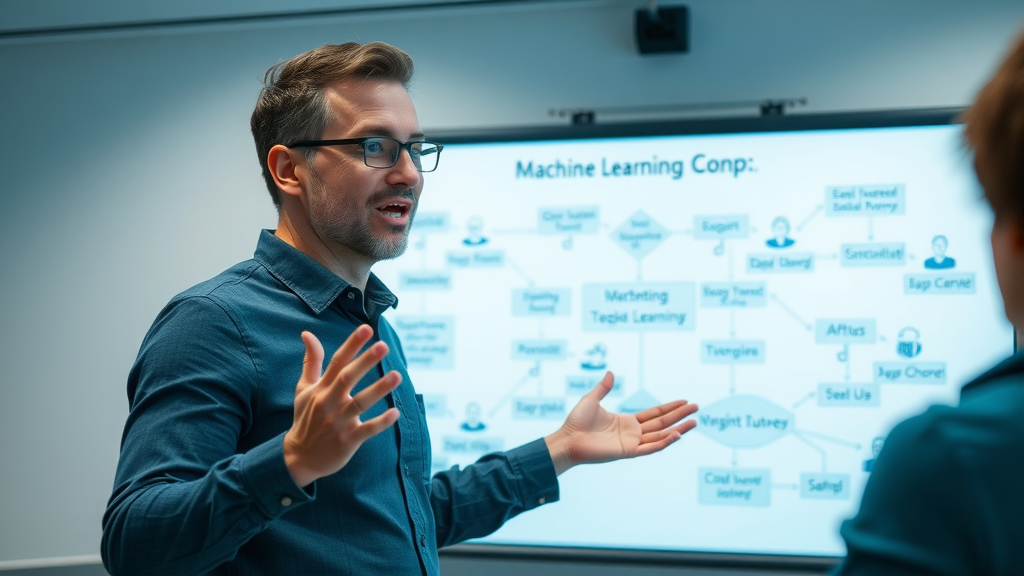Did you know that over 80% of marketing executives are expected to rely heavily on machine learning for every key decision by 2025? In an era where customer data is generated at breakneck speed, staying ahead requires more than just intuition—it demands the strategic leverage of machine learning marketing strategies . This comprehensive guide will show you how modern marketers are transforming their reach and results by incorporating machine learning into their core marketing processes.

Why Machine Learning Marketing Strategies Are Redefining Success in the Digital Age
The rise of machine learning marketing strategies is fundamentally changing the digital marketing landscape. Unlike traditional approaches that often rely on manual data analysis and reactive moves, machine learning brings artificial intelligence and automation to the forefront. This allows marketers to sift through a vast amount of customer data in real-time and make highly informed decisions with unprecedented speed and accuracy.
Modern marketers now harness learning algorithms to identify patterns, predict customer behavior, and automatically personalize each interaction. The result? Dramatically improved conversion rates , more relevant campaigns, and increased ROI. Whether your goal is to boost customer engagement or fine-tune your marketing strategies , machine learning in marketing is the engine that transforms granular customer data into scalable, actionable insights.
"By 2025, it is predicted that over 80% of marketing executives will rely extensively on machine learning to power all key marketing decisions." – Gartner
Unlocking the Value: Key Learnings from Machine Learning Marketing Strategies
- Understand the impact of machine learning in marketing strategy
- Learn how predictive analytics shapes marketing campaigns
- Discover how customer segmentation elevates personalization
- Explore practical case studies using machine learning models
- Get actionable insights for your next marketing campaign

The Fundamentals of Machine Learning in Marketing
What Is Machine Learning in Marketing?
At its core, machine learning in marketing refers to the use of advanced learning algorithms and artificial intelligence to process and make sense of customer data . By analyzing everything from historical data to real-time interactions, machine learning helps marketers identify patterns and predict future behavior with a precision unattainable by human analysis alone.
Unlike rule-based systems, machine learning models dynamically adapt as they ingest more data. Consider how natural language processing tailors a chatbot’s responses based on evolving queries, or how personalized recommendations are delivered in real-time as users browse online. In every aspect of modern marketing strategies , machine learning creates a feedback loop that amplifies the effectiveness of campaigns over time.

Core Concepts: Machine Learning Models and Their Role in Marketing Strategies
Machine learning models come in various forms—supervised, unsupervised, and reinforcement learning methods. In marketing, these models drive everything from predictive analytics and customer segmentation to dynamic pricing and personalized content delivery. The central idea is to automate data analysis and decision-making, ensuring campaigns evolve based on actual outcomes, not just assumptions.
For example, supervised models are frequently used to score leads or predict the likelihood of customer churn, while unsupervised models might cluster buyers into targeted segments based on shared behaviors. Reinforcement learning even allows algorithms to improve marketing campaign effectiveness through continual experimentation and results tracking. The outcome? Entire marketing strategies become more adaptive, smart, and effective.
| Feature | Traditional Marketing | Machine Learning Marketing |
|---|---|---|
| Data Analysis | Manual, Time-Consuming | Automated, Real-Time |
| Personalization | Basic Segmentation | Dynamic, Hyper-Relevant Offers |
| Customer Segmentation | Demographic-Based | Behavioral, Predictive, & Intent Clusters |
| Campaign Optimization | Post-Launch Adjustments | Continuous, Data-Driven Updates |
| Results | Slower ROI, Limited Adaptation | Accelerated ROI, Rapid Iteration |
How Machine Learning Marketing Strategies Transform Customer Data into Actionable Insights
Data Collection and Data Analysis in Machine Learning Marketing Strategies
With machine learning marketing strategies , data collection moves far beyond clicks and opens. Marketers now harvest a vast amount of data—website interactions, purchase behavior, social media engagement, and even offline transactions. Sophisticated data analysis tools automatically process this information, quickly surfacing meaningful insights that would be nearly impossible to extract using traditional methods.
The power of automated learning algorithms lies in their ability to handle enormous, ever-changing datasets with precision. As campaigns run, models continually refine themselves to predict customer preferences, detect emerging trends, and optimize offers. This iterative loop means each marketing campaign is more informed and effective than the last, driving superior conversion rates and higher customer satisfaction.

"The power of machine learning lies in its ability to convert millions of data points into tailored marketing solutions."
Customer Segmentation: Precision Targeting Using Machine Learning Models
Machine learning shines brightest in customer segmentation —breaking down large, diverse audiences into tightly defined groups. Unlike broad demographic buckets, these models uncover deep behavioral and intent-based clusters. This enables delivery of personalized marketing messages, offers, and content that truly resonate with the unique motivations of each customer segment.
For instance, an online retailer might use machine learning models to predict which customers are price-sensitive bargain seekers versus those who value exclusive product launches. This segmentation results in more tailored marketing campaigns , reduced waste, and an overall improved customer experience . The data-driven approach helps marketers allocate budgets more effectively, maximizing results at each customer touchpoint.

Enhancing Customer Experience Through Dynamic Machine Learning-Driven Personalization
The holy grail of modern marketing is personalization . Machine learning algorithms enable dynamic delivery of tailored content, offers, and recommendations across all channels—email, web, mobile, and beyond. This is possible because models rapidly process real-time behavioral data and adapt responses with every new interaction.
Take personalized recommendations on e-commerce sites: as a customer shops, the site dynamically curates products based on past behavior, purchases, and even what similar users bought. This approach increases basket size, boosts conversion rates, and deepens customer loyalty. Machine learning in marketing ensures every customer journey feels individually crafted, greatly enhancing overall customer experience .

Designing and Implementing Effective Machine Learning Marketing Strategies
Building a Robust Machine Learning Model for Marketing Campaigns
The first step to effective machine learning deployment in marketing is building a strong machine learning model tailored to your objectives. This involves gathering clean, relevant customer data , defining the desired business outcomes, and selecting appropriate algorithms. Collaboration between marketers and data scientists ensures that the model accounts for real-world marketing priorities and technical nuances.
Rigorous data cleansing and feature engineering come next—preparing and transforming raw data into usable insights. After training the model, marketers should monitor its performance, validate accuracy, and adjust parameters as needed. The more a learning model is evaluated and improved, the more valuable insights it can generate for marketing efforts like targeting, personalization, and campaign optimization.

Leveraging Machine Learning and Predictive Analytics for Smarter Marketing Campaigns
Predictive analytics transforms marketing campaigns from guesswork to science. By crunching historical data and customer behavior , machine learning algorithms anticipate what prospects are most likely to want or do next. This foresight empowers marketers to run proactive, precisely targeted campaigns with a higher likelihood of success.
For example, imagine dynamically adjusting digital ad spend based on predicted conversion rates, or sending out win-back offers when a model forecasts likely customer churn. The ability to anticipate—and act on—customer needs means marketing resources are used more wisely, customer journeys are more seamless, and overall ROI climbs higher.

Best Practices for Integrating Learning Models with Marketing Strategies
- Map business objectives to machine learning outcomes
- Ensure quality customer data collection
- Utilize iterative model training and validation
- Align marketing team workflows with new machine learning platforms
Integration success starts with clear goal alignment—each machine learning model or algorithm should tie directly to marketing objectives, such as increasing engagement or optimizing ad spend. Continuously feed your models high-quality data and iterate campaigns based on learnings. Collaboration among stakeholders—data scientists, technical teams, and creative marketers—is essential for smooth rollout and long-term effectiveness of machine learning marketing strategies .
Above all, make ongoing measurement and validation a habit. The marketing landscape evolves fast, and your learning models should evolve with it. By continuously testing, refining, and retraining models, your marketing strategies remain fresh, effective, and competitive in today’s data-rich world.
| Step | Action | Impact |
|---|---|---|
| 1 | Acquire customer data from all channels | Establishes a rich data pool for insights |
| 2 | Clean, merge, and structure data | Ensures data quality for model training |
| 3 | Train and validate machine learning model | Uncovers actionable patterns and predictions |
| 4 | Segment and target audiences automatically | Delivers highly personalized marketing messages |
| 5 | Automate campaign execution and optimize continuously | Maximizes ROI through real-time feedback and adjustment |
Case Studies: Driving Results with Machine Learning in Marketing Campaigns
E-Commerce: Customer Segmentation Leading to 30% Higher ROI
A leading e-commerce retailer used machine learning models to segment its customer base far beyond simple demographics. By clustering shoppers based on browsing history, purchase frequency, and customer behavior , the brand delivered targeted offers to each group via automated emails and personalized website experiences.
The outcome? Campaigns delivered precisely to the right users at optimal times, boosting relevance and engagement. The company observed a stunning 30% uplift in ROI compared to traditional campaigns—a direct result of smarter, data-driven marketing efforts powered by machine learning marketing strategies .

Retail: Predictive Analytics for Dynamic Pricing Models
In retail, predictive analytics via machine learning has transformed the pricing game. Major chains now utilize learning algorithms to monitor historical data , competitor prices, inventory levels, and even weather patterns, setting prices that maximize profit while minimizing stockouts.
Dynamic pricing not only enhances revenue but also ensures fair value for both business and customer. Since adjustments are driven by real-time insights, pricing can flex quickly to match demand, seasonality, or customer loyalty segments—a major leap over static, manual tactics.
B2B: Lead Scoring Improvements via Machine Learning Models
For B2B marketers, lead scoring is critical to success. Machine learning improves this process by analyzing behavioral and firmographic data to predict which prospects are most likely to convert. Scoring is no longer guesswork; instead, marketers focus their time and budget on high-potential leads identified with data-backed confidence.
One major SaaS provider deployed machine learning algorithms to filter emerging leads and refine outreach. The result? Their sales team saw higher conversion rates and closed deals faster, attributing the success to smarter use of customer data via advanced learning models.
Overcoming Challenges in Machine Learning Marketing Strategies
Addressing Common Data Quality Issues in Customer Data
Even the most powerful machine learning marketing strategies can falter if built on flawed data. Successful teams commit resources to rigorous data hygiene: removing duplicates, correcting errors, and ensuring consistent formats across sources. Quality assurance at every step—from collection to processing—ensures that models make accurate, actionable predictions.
Partnering data analysts with marketers to review datasets and audit processes regularly is a proven way to minimize risk. A holistic focus on data quality means your marketing campaigns not only launch with confidence, but continuously improve as your models consume new, robust information.

Dealing with Machine Learning Model Bias and Interpretability
As machine learning algorithms become decision engines for marketing efforts, interpreting their output and rooting out bias is vital. Models may unintentionally propagate historic biases or favor certain segments. Marketers can address this by including diverse datasets, setting fairness constraints, and performing regular bias audits within their learning models.
Interpretable models are equally important—stakeholders must understand (and trust) how predictions are made. Transparent reporting, clear documentation, and collaborative review processes help ensure machine learning in marketing delivers not just results, but reliable, fair, and ethical outcomes.
Safeguarding Customer Experience and Trust in Automated Marketing
Automation is powerful, but customer trust is paramount. Always use data responsibly and transparently, informing users how their information fuels personalization and why messages appear. Implementing clear data privacy practices and offering opt-out options are crucial for maintaining credibility and customer loyalty.
By prioritizing user experience and trust as much as innovation, marketers can unlock the full power of machine learning marketing strategies while strengthening their brand’s reputation in a rapidly evolving digital world.
"Adopting machine learning in marketing means prioritizing transparency and reliability as much as innovation."
Top Machine Learning Tools and Platforms for Marketing Strategies
- HubSpot: AI-powered customer segmentation
- Salesforce Einstein: Marketing campaign optimization
- Google Cloud AI: Building custom machine learning models
- Mailchimp: Predictive analytics for email marketing
Selecting the right platform is essential for scaling your machine learning marketing strategies. Evaluate options based on your use case—do you need robust lead scoring, automated segmentation, or integrated A/B testing? Top-tier tools provide user-friendly dashboards, reliable integrations, and scalable features to support data-driven marketing from day one.

The Future of Machine Learning Marketing Strategies
Emerging Trends: AI-Driven Omnichannel Experiences
The next frontier in machine learning marketing strategies is the rise of AI-powered omnichannel experiences —seamless, coordinated campaigns across every customer touchpoint. Algorithms will unify messaging, offers, and engagement across email, social, app, and web. As natural language processing and image recognition mature, marketers can deploy interactive, personalized experiences at scale.
Expect more automated chatbots, AI-driven media buying, and even virtual assistants shaping customer journeys in real-time. These innovations will provide unprecedented levels of connectivity and personalization.
Aligning Machine Learning with Sustainable and Ethical Marketing Practices
Responsible marketers must ensure their machine learning marketing strategies are ethical and sustainable. This means honoring privacy, using data only for agreed-upon purposes, and actively minimizing environmental and societal impact. Employ algorithms designed for energy efficiency and select partners committed to digital ethics.
Transparency, fairness, and responsible data stewardship will not only protect your brand but also strengthen relationships with informed, values-driven customers in the years ahead.
How to Future-Proof Your Machine Learning Marketing Strategies
The best way to future-proof your approach is by building agile, scalable systems. Invest in continual learning: retrain your models with fresh data, stay informed about technology shifts, and upskill your teams. Cultivate a culture of experimentation—test, measure, refine, and never stop iterating.
The pace of innovation in machine learning in marketing is swift. Staying ahead means embracing change and evolving alongside both the technology and your customers’ expectations.
Answers to Common Questions About Machine Learning Marketing Strategies
How is machine learning used in marketing?
Machine learning is used in marketing to automate data analysis , improve customer segmentation , personalize messaging, and optimize marketing strategies for better ROI. By processing a vast amount of customer data , algorithms identify patterns, predict customer behavior, and help marketers make smarter decisions throughout the buyer journey.
What is the best AI tool for marketing strategy?
The best AI tool depends on business needs; popular choices include Salesforce Einstein and Google Cloud AI for robust, scalable machine learning marketing strategies . HubSpot and Mailchimp are great for smaller businesses seeking AI-driven customer segmentation and email predictive analytics .
What are the 3 C's of machine learning?
The 3 C’s are Capacity, Complexity, and Computation: These key factors influence how effective your machine learning models are in making predictions and scaling across different marketing strategies . Strong models balance these elements for optimal speed, accuracy, and reliability.
What are the top 7 types of digital marketing strategies?
The top 7 digital marketing strategies include content marketing, email marketing, SEO, social media marketing, PPC, influencer marketing, and affiliate marketing—many of which are now enhanced by machine learning for improved targeting, personalization, and campaign optimization.
Key Takeaways for Adopting Machine Learning Marketing Strategies
- Leverage customer data and predictive analytics
- Personalize every stage of the buyer journey
- Choose scalable and ethical machine learning models
- Continuously iterate marketing campaign optimization
Ready to Supercharge Your Growth? Harness the Power of Machine Learning Marketing Strategies
Now is the moment to elevate your marketing. Invest in machine learning marketing strategies to unlock better insights, smarter campaigns, and stronger growth—starting today.
To deepen your understanding of machine learning marketing strategies, consider exploring the following resources:
-
“Machine Learning and Marketing: Tools, Examples, and Tips Most Teams Can Use” : This article provides practical insights into how machine learning can enhance marketing efforts, including personalization, content distribution optimization, and ad targeting. ( blog.hubspot.com )
-
“How to Use Machine Learning in Digital Marketing” : This guide explores various applications of machine learning in digital marketing, such as predictive analytics, customer segmentation, and personalized recommendations, offering real-world examples to illustrate these concepts. ( newtarget.com )
These resources offer valuable perspectives and practical examples to help you effectively integrate machine learning into your marketing strategies.
 Add Row
Add Row  Add
Add 




 Add Row
Add Row  Add
Add 
Write A Comment